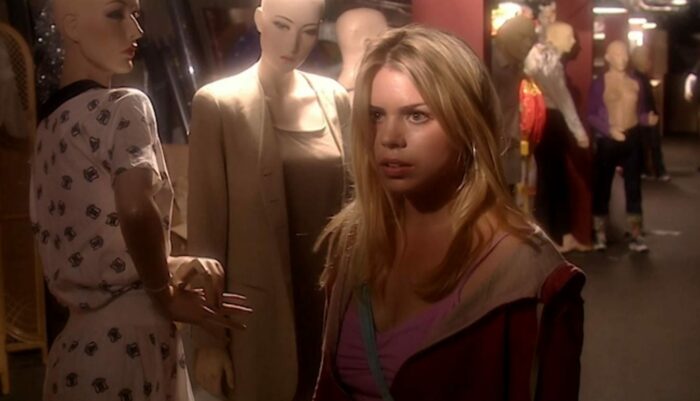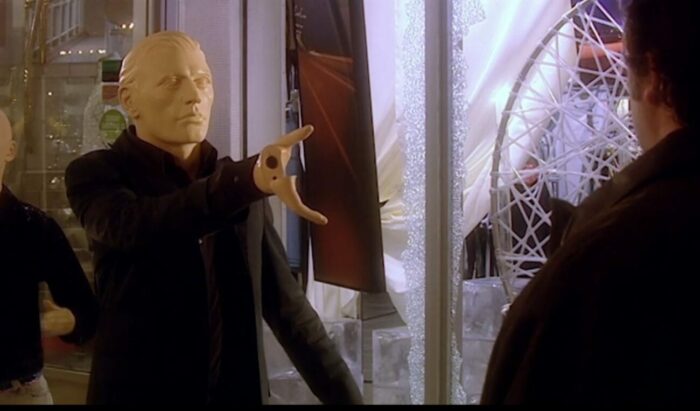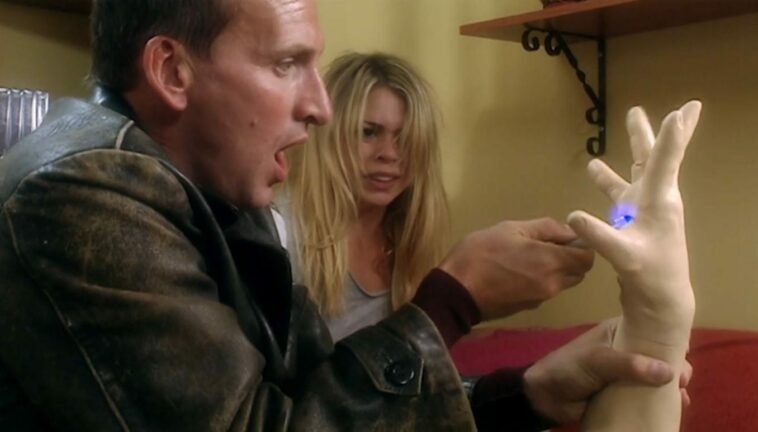The first time I watched Doctor Who, I think it was probably 2010 (the year I turned 30, if you’re interested in marking time that way). I’d had some vague awareness of the idea of Doctor Who throughout my life, but as an American I can’t say I even had a concrete notion as to what it was all about. I’d certainly never heard of a TARDIS, and somehow even though I had been a fan of science fiction and shows like Star Trek from the time I was a child, Doctor Who always had a way of striking me as just a step too nerdy, or perhaps too British, or too old, or too…something. Add to this a general lack of availability and a lack of prevalence in American culture, and I wasn’t even really aware of the reboot (or New Who) when it began in 2005. It wasn’t until it showed up on Netflix (and an old friend whose opinions I have always valued highly recommended I give it a chance) that I decided one night to press play on S1E1 of the New Who—“Rose.”
I mention all of this because I think that this perspective feeds into just how perfect of an introduction “Rose” gives to Doctor Who. The Doctor doesn’t even appear until five minutes in. The TARDIS isn’t introduced until more than halfway through. Rose Tyler (Billie Piper) is our entry point, and as someone new to the Whoniverse I was just as bewildered as she was. And I think Russell T Davies had all of this in mind with the way Doctor Who returned to our screens. One can imagine old-school fans being perhaps a little disappointed with this inaugural episode; if that’s you, try and imagine coming into this with fundamentally no idea what is going on.

We begin with a shot of the Earth before homing in on the life of Rose Tyler. We see her morning routine, such as it is, and meet her mother Jackie (Camille Coduri). We see her with Mickey (Noel Clarke), having a nice moment by a fountain. We see her working her retail job, and then one night as she is ready to call it a day, descending to the basement in order to deliver the lottery money to Wilson. And the basement is very creepy.
These early shots of “Rose” actually play like a horror film, and we don’t know quite how dark Doctor Who (or the New Who) is going to be. Plastic mannequins begin to move, and of course Rose at first thinks it is some kind of joke—just like she would if this were the beginning of some slasher movie where the cold open might end with her screaming as her blood splatters across the frame—but it isn’t. These dummies are apparently malicious, though their plastic faces are quite inscrutable, much less their intentions.
There is something uncanny to the human-shaped object coming to life, and even if we know we’re safe (because surely Doctor Who is not going to be that dark), it isn’t really until the Doctor arrives that the tension is relieved. Though it is quickly replaced with another, new tension: who is this man and what is going on?

Rose speculates that the whole thing with the mannequins has something to do with students, and the delightful repartee between her and the Doctor begins. It is easy to almost miss how he brusquely informs her that Wilson is dead, and indeed their whole exchange amounts to him withholding information from Rose and then asking her to shove off—run for your life.
The Doctor (whom we have just met in this iteration) proceeds to blow up the department store for reasons that are hardly explained, and we’re back to Rose and Jackie (well, mostly Jackie) reacting to what has occurred. Mickey arrives and wants to go to the pub, hoping to catch the end of a match (even though he pretends this isn’t the reason), but not before he jokingly “chokes” himself with the arm of a dummy that has somehow returned home with Rose.
Blowing up the department store doesn’t actually solve the problem of what’s going on with the living plastic, as we see when the Doctor comes around to Rose’s flat the next day and is actually choked by the mannequin arm. Rose saves him, but almost more noteworthy is that he hasn’t come around for any reason having to do with Rose—it is as though he doesn’t even know that she lives there and he is surprised to see her.
Throughout S1E1, we are introduced to a Doctor who is fundamentally cold, or at least detached from human connection. As much as he tells Rose he is fighting for the sake of humanity (and he is), he doesn’t seem to care whether Mickey lives or dies, and this isn’t just due to the fact that he doesn’t respect Mickey. Christopher Eccleston plays the Doctor with an attitude that is at once playful and sincere—he is dealing with things that are deadly important but wants to leave others out of it, perhaps in part because he’s having a good time frolicking through the danger.

There is some indication that the Doctor has just recently regenerated, when he checks himself out in the mirror and comments on his ears, but then we get the scenes with Clive, who has been tracking the Doctor across time—the assassination of JFK, the Titanic, Krakatoa…the Doctor was there. His one constant companion is death, Clive says. What untold tragedies lie in the Ninth Doctor’s past, and what has led him to the attitude he adopts in “Rose” before the titular Rose Tyler finally wins him over by the end of the hour?
It is fundamentally Rose who pursues the Doctor after their first meeting, taking to the Internet and managing to find a result by typing in “Doctor Blue Box.” This leads her to meet with Clive, the aforementioned man who resembles a conspiracy theorist with regard to the Doctor, but Clive happens to be almost entirely right.

What he hasn’t put together is the regeneration bit, as all of his photos are of the Ninth Doctor, and indeed I am almost reluctant to admit it now but I had no idea about this when I started watching the show. Thus it serves to maintain the mystery of the central character, and unlike Rose I did not take to Google to find out more. I allowed the narrative to unfold for me and felt the hit when the Doctor I had come to know and love finally left me at the end of Season 1.
The character of the Doctor, and its inconsistent consistency, is matched in “Rose” by the narrative itself. Mickey gets eaten by a plastic garbage can, which it seems transports his actual body below ground…somehow (we find him there later). Plastic Mickey takes his place and looks wonderfully slick, like an action figure of the man we’ve come to know, but Rose doesn’t seem to notice even as the fake Mickey begins twitching out at the restaurant table. It’s not until the Doctor shoots a champagne cork into his malleable face that things click.

It’s ridiculous and absurd in a way that is a whole lot of fun, as the text of this first hour of the New Who rather subtly lets us know not to take it all too seriously. The threat of the Nestene Consciousness is laid out well in a conversation between the Doctor and Rose, for example, leading one to imagine what might happen if all of the plastic in the world came to life in order to attack us—including breast implants. But when it comes down to it, the episode sticks with the shop dummies and these alone (give or take a trash bin), but then for some reason gives them guns hidden within their plastic hands. How does this make sense? Do all mannequins in the UK secretly have guns hidden behind their fingers? Is this some kind of subtle dig at the policing measures enacted in the wake of 9/11? And does our friend Clive get killed?

It’s not that Doctor Who asks you to not think about such questions. It presents them and withholds answers that would resolve them and make them go away. It provides food for thought, and I recall in those early days of watching the show, as I was also in the midst of writing on the philosophy of Immanuel Kant having this experience where it felt as though I comprehended the thing-in-itself in a dream, but once I awoke…well, saying it was all “wibbly-wobbly timey-wimey stuff” was about the best I could put it.
The Doctor’s enthusiasm is infectious, as the friend who recommended the show to me put it, and this is also what we see in the pilot episode of the New Who. Perhaps the moment that sticks in my mind most indelibly is when Rose figures out that the large circular structure the Doctor is looking for in the middle of London is the Millennium Wheel. He’s slow to catch on and says “what?” more than once, but then the two are off running in excitement, already the pair that they will grow to be through their future adventures together.

And that thrill of adventure is there again at the end of the hour, as the Doctor invites Rose to travel with him and acknowledges that it is always this dangerous but with a look of glee in his eyes. And of course Rose demurs, until he returns to make sure she knows they can also travel in time, at which point she abandons Mickey and Jackie (well, not really) and is off running towards the TARDIS and the next adventure at the end of the world.
The teaser tag is important. “Rose” is a fairly mundane story—give or take some evil shop dummies—but it ends with a promise to dive right into the very boundaries of what is possible for a show with this premise in Episode 2. The theme music plays, already feeling familiar, and welcoming us to the ride along with the Doctor and Rose, wherever in space and time it may take us.

The Doctor’s constant companion isn’t death, but hope. It’s in his plea to the Nestene Consciousness that humanity is just getting going—we’ve only begun to figure things out, with all of the potential in the universe laid out in front of us. The real enemy is not the alien or the novel. The real enemy is despair.


I always thought there was too much emphasis on Rose rather than the Doctor; being a fan of the old series, but after the dullness of Amy, Rory and especially Clara , I’m enjoying Rose’s stories a lot more, even though I felt she drowned out David Tennant’s Doctor at first.